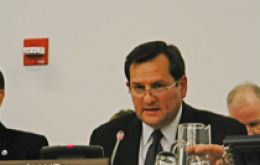MercoPress. South Atlantic News Agency
Tag: Falklands / Malvinas
-
Tuesday, March 5th 2013 - 00:39 UTC
The Falklanders will speak clearly

The Globe and Mail (*) editorial published Sunday, March - As a country that with some justice prides itself as a global beacon for democracy, the United States should abandon its equivocation over the status of the Falkland Islands and agree to throw its considerable weight behind the winner of the referendum asking Islanders whether they wish to remain a UK overseas territory.
-
Tuesday, March 5th 2013 - 00:15 UTC
Sixty international media representatives will report on the Falklands’ referendum

The Falklands March 10/11 referendum on the political future of the Islands has attracted a surprising amount of interest from the world press with sixty television, newspaper and radio journalists arriving primarily on next Saturday’s LAN weekly flight to the Islands.
-
Tuesday, March 5th 2013 - 00:09 UTC
Argentina dismisses referendum; warns Falklands’ oil industry “unfeasible” without regional ties

The referendum on the fate of the Falkland Islands is a publicity stunt with no legal status, Argentina's ambassador to Britain said on Monday, warning that oil exploitation around the territory was impossible without better regional ties.
-
Monday, March 4th 2013 - 05:43 UTC
Senkaku/Diaoyu Islands: Another Falklands?

By Gwynne Dyer - Chinese survey vessels go into the waters around the disputed islands and Japanese patrol ships tail them much too closely. Twice last month Chinese maritime surveillance aircraft flew into the airspace around the Japanese-controlled islands and Tokyo scrambled F-15 fighters to meet them. On the second occasion, China then sent fighters too. Can these people be serious?
-
Monday, March 4th 2013 - 05:34 UTC
C24 president insists Falklands dispute is over sovereignty, not self determination

The UN Decolonisation Committee has not received any further requests on the Falklands/Malvinas issue, and “there is no such procedure as self-determination regarding the Islands dispute”, according to the C24 president Diego Morejón Pazmiño, standing Ecuadorean ambassador before the UN.
-
Saturday, March 2nd 2013 - 07:46 UTC
“We want sovereignty over the Malvinas, but in peace”, Cristina Fernandez tells Congress

Argentine president Cristina Fernandez again called on the UK to hold talks over the sovereignty of the Falklands/Malvinas Islands during her address to Congress on Friday when she delivered the ‘State of the Nation’ speech and formally opened the 131st legislative sessions.
-
Thursday, February 28th 2013 - 14:13 UTC
Falklands’ situation attracts attention from China involved in Far East Asia islands dispute

Interest in the Falkland Islands’ dispute with Argentina, assimilated to the current Senkakus/Diayous islands situation in Asia apparently has not been limited to the quotes made by Prime Minister Shinzo Abe before the Japanese Parliament but also in another minor experience precisely in the Falklands and involving the Editor of the Penguin News, the local weekly newspaper of the Islands.
-
Monday, February 25th 2013 - 06:36 UTC
Argentina celebrates Africa’s 54 countries support for Malvinas sovereignty

Africa’s fifty four countries joined South America “in recognizing the legitimate sovereignty rights of Argentina over the Malvinas, South Georgia and South Sandwich Islands and the adjoining maritime spaces”, announced the Argentine Ministry of Foreign Affairs in a communiqué in reference to the so called Declaration of Malabo, capital of Equatorial Guinea.
-
Wednesday, February 20th 2013 - 05:13 UTC
Malvinas: read what the real world is saying

By Fernando Petrella (*) - The following article by an Argentine former Deputy Minister of Foreign Affairs was published as a column in the Buenos Aires media. The following reproduction in English is not necessarily literal but tries keep to its spirit as much as possible.
-
Friday, February 8th 2013 - 04:49 UTC
Timerman in London: a scam conference that almost worked

By Peter Pepper - Private conferences have long been used by pressure groups to get something they want onto the public agenda. The so-called Argentine-British Conferences were like this. They were an Argentine idea, and the so-called 'British' delegations were largely controlled by, and packed with, Falklands’ opponents in Britain. They achieved the nickname the Argentine Biased Conferences or the Anti-British Conferences. But they failed in their objective and faded away.
